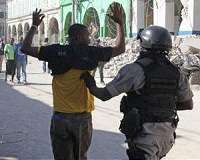| . |  |
. |
Port-Au-Prince (AFP) Jan 24, 2010 Thousands of Haitian voices rose in prayer from ruined churches Sunday, as recovery teams began to bulldoze the capital's devastated centre and a French ship carrying supplies arrived. Twelve days after a catastrophic earthquake razed much of the city, hundreds of thousands of Haitians remained in desperate need of food, water and shelter, despite a large-scale US military intervention and UN-run aid program. In Port-au-Prince, morning prayers and song gave way to apocalyptic scenes as earthmovers cleared downtown rubble, spewing rotting corpses into the streets and opening new routes for looters to swarm through the ruins. Haitian police shouted out from time to time to deter the gangs, but with little conviction and less success. "We won't do anything, there's nothing we can do," one of them said on Rue du Miracle. The police did shoot one young man, however, witnesses said. He was treated at the scene by the US troops now also patrolling the city looking for sites to hand out humanitarian aid, then taken away by ambulance. International donors meanwhile prepared to meet Monday in Montreal to discuss rebuilding Haiti after the quake, which killed at least 112,000 people in the worst recorded disaster ever to hit the Americas. In the skeletal shadow of Port-au-Prince's shattered Roman Catholic cathedral where the city's archbishop was buried on Saturday, Father Glanda Toussaint held mass at an altar improvised on a wooden table. Before the January 12 quake around 2,500 people would fill the pews at the cathedral. When Toussaint asked today's congregation of around 300 if they understood why the disaster happened, the crowd murmured their incomprehension. "All is not the will of God but all is providential," he said. "What we are going through is not finished, we must reconstruct the country and reconstruct our faith. As a Haitian, it hurts." During the mass, immediately behind the cathedral, at least two rotting corpses could be seen still trapped in the rubble of its collapsed wall. Aid workers have been moving into the recovery phase after the government officially called off search and rescue efforts, but an international team on Saturday dug out 25-year-old Wismond Exantus from the ruins of a shop. "I feel good," Exantus said in hospital. "I survived by drinking Coca-Cola." Rescue teams have saved more than 130 people from the wreckage of Port-au-Prince since the 7.0-magnitude quake. But there was a tragic false alarm after a college head received a text message from a friend who was trapped and rescuers checked the area with dogs and radar four times but found no signs of life. "There was nothing. It could be explained by the fact that the SMS arrived late, like on New Year's Day, because there were so many calls," French firefighter Christian Morel said. On Sunday a French navy amphibious assault ship equipped with two landing craft, four helicopters and onboard operating theatres arrived in Haitian waters to offload 2,000 tonnes of humanitarian aid. The crew of Siroco, a 12,000-tonne Foudre-class warship, will spend four days offloading aid and equipment for rescue teams, including mechanical diggers to clear the rubble left by thousands of ruined homes. The United States military has spearheaded aid efforts in Haiti, with 20,000 troops due to reach here by Sunday. France initially hit out after US forces took over control of the main airport but tensions soon eased. Vital aid was also slowly reaching devastated areas outside Port-au-Prince for the first time, including Leogane, the town at the epicentre of the earthquake, where around 90 percent of all buildings were destroyed. The International Organisation for Migration, which is leading efforts to provide shelter for victims, said Sunday it had 10,000 family-sized tents ready but that it needed a total of 100,000. Conditions remain grim for survivors in the capital, although most of the bodies which lay rotting for days on the streets in the chaotic aftermath of the quake have now been collected and buried in mass graves. Experts warn that hundreds of thousands of Haitians will be living off foreign aid and in temporary housing for years to come as rebuilding the nation may take at least a decade. Thousands have been left disabled. The United States, Canada, France, Brazil and other donors meeting in Montreal will attempt to craft long-term strategies to lift the crippled country, the poorest in the western hemisphere, onto a path to recovery. burs-dc/dk
Share This Article With Planet Earth
Related Links Bringing Order To A World Of Disasters A world of storm and tempest When the Earth Quakes
 Haitian police count their losses, prepare for calamity
Haitian police count their losses, prepare for calamityPort-Au-Prince (AFP) Jan 24, 2010 Police in the Haitian capital counted their loses and gathered their forces Sunday, preparing for a surge in crime they are certain will follow the devastating January 12 earthquake. Police leaders are still trying to determine how many officers can report for work and how many police stations are still operational. Looting is widespread in this city struggling to recover from the powerf ... read more |
|
| The content herein, unless otherwise known to be public domain, are Copyright 1995-2009 - SpaceDaily. AFP and UPI Wire Stories are copyright Agence France-Presse and United Press International. ESA Portal Reports are copyright European Space Agency. All NASA sourced material is public domain. Additional copyrights may apply in whole or part to other bona fide parties. Advertising does not imply endorsement,agreement or approval of any opinions, statements or information provided by SpaceDaily on any Web page published or hosted by SpaceDaily. Privacy Statement |